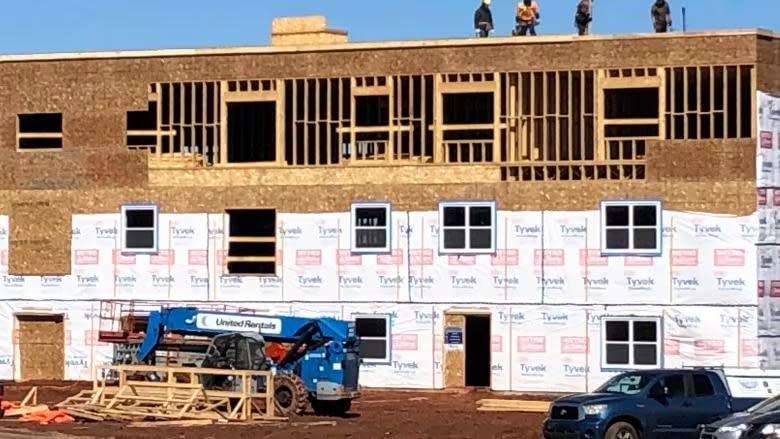N.B. finished last in Maritimes in 2023 housing starts, despite cancelling rent caps

Efforts among the Maritime provinces to have more housing built quickly show Prince Edward Island and Nova Scotia are having more success than New Brunswick, despite the New Brunswick government's loosening of tenant rent protections last year in an effort to boost development.
According to data compiled by the Canada Mortgage and Housing Corporation, New Brunswick saw construction begin on 4,547 new housing units from January through December 2023, including houses, townhouses, apartments and condominiums.
That was 2.8 per cent fewer units beginning construction than in 2022.
The 2023 total represents 545 new housing starts in New Brunswick per 100,000 people, based on July 1 population numbers.
That was below the national average for the year and well behind numbers over the same period posted by both P.E.I., which had 655 housing starts per 100,000, and Nova Scotia, which had 676 per 100,000.

Warren Maddox is executive director of Fredericton Homeless Shelters and says that progress on getting homes built in New Brunswick has been too slow. (Edwin Hunter/CBC)
"That's disappointing. I hadn't heard that before," said Warren Maddox, the executive director of Fredericton Homeless Shelters Inc.
Maddox has been advocating for a quicker response by government to New Brunswick's housing shortage but said even he didn't realize other provinces were doing that much better getting new housing started.
"There's a lot of talk. Everyone knows what needs to happen," said Maddox.
"We can talk about it all we want. We need to get some housing built."
All three Maritime provinces have made new housing a priority to cope with surges in their populations.
At the end of 2023, 2.1 million people were living in the region according to estimates by Statistics Canada — 152,000 more than three years earlier.
That growth has outstripped the supply of housing in each province and triggered escalations in real estate prices and upward pressure on the cost of rent. It's also driven hundreds of vulnerable residents into homelessness.

Alan Roy of Service New Brunswick told MLAs last year the government had no evidence other than the word of landlords and developers that rent caps were impeding new housing construction in New Brunswick. (Jacques Poitras)
Last June, the New Brunswick government estimated the province needs 6,000 new housing units per year to deal with the shortage and said it would be relying heavily on private developers to make that happen by "creating conditions" that incentivize building.
One of those incentives implemented at the end of 2022 was to cancel a policy that capped the size of rent increases New Brunswick tenants can be charged each year.
In January 2023 under questioning at the Legislature's Crown corporations committee, the chief executive officer of Service New Brunswick, the body in charge of housing issues at the time, told MLAs that developers and landlords had convinced the province that a hard limit on rent increases was impeding new construction.
"The rent cap itself had some negative consequences," said Alan Roy during his testimony.
"We were advised and made aware in some of the stakeholder consultations we were having that it was discouraging development of new units."
Kent South Liberal MLA Benoît Bourque, a former Service New Brunswick minister, said he found it "disturbing" that the government killed rent cap protections for tenants based only on comments from developers, and asked Roy if the province had any independent data to show rent cap protections for tenants were restricting the construction of new units.
"No," said Roy.
"It would have been comments I would have received first-hand from individuals that were either pulling out of a province because they implemented a rent cap and they told us first-hand if that's what's happening in a jurisdiction I won't be building there — so that is first-hand evidence that I would have heard."

Last year Kent South Liberal MLA Benoît Bourque asked for any independent evidence the New Brunswick had showing rent caps for tenants were hurting housing development. None was provided. (Michel Corriveau/Radio-Canada)
Bourque pointed out that several provinces — including P.E.I. and Nova Scotia — have rent caps and asked if they have seen housing construction suffer as a result.
" Are you aware of any jurisdictions where rent caps stifled the development of rental housing?" asked Bourque.
"No, I am not aware whether it stifled or not," replied Roy.
" Again I was going with verbatim comments I would have received from landlords in particular."
Matthew Hayes is a sociology professor at St. Thomas University and a spokesperson for the New Brunswick Coalition for Tenants Rights.
He said because eliminating rent caps for tenants in New Brunswick did nothing to boost new housing construction in 2023 and retaining the policy in the other Maritime provinces appeared not to undermine development, there is no reason caps should not be reinstated.

Matthew Hayes is with the New Brunswick Coalition for Tenants Rights. He's calling for a return of rent caps after P.E.I. and Nova Scotia kept theirs and still posted more housing starts than New Brunswick in 2023. (Pascal Raiche-Nogue/Radio-Canada)
"We absolutely need a rent cap as quickly as possible. That is a minimal and costless intervention into the market to provide security for New Brunswickers." said Hayes.
"The majority of Canadians have rent control. There's been lots of development in other provinces. Lack of development here is completely unrelated to rent control," he said.
Julia Woodhall-Melnik, a housing specialist at the University of New Brunswick and co-director of its Housing, Mobilization and Engagement Research Lab, said it is difficult to draw conclusions from one year of data but it does appear to her the government's belief that rent caps restrict development has been debunked by what's happening in the three provinces.
"I'd like to see the data over a longer period of time but what it is showing me right now is that there was no evidence for the claim that rent control would impact development," said Woodhall-Melnik. "Right now that argument doesn't look like it holds weight with what we're seeing."
In an email, a spokesperson for the New Brunswick government said it is looking into what 2023 housing start numbers show but it has not yet finished that analysis.
"We are going to need more time," said the email. "We are waiting to verify a few details before we are able to share what we have."

